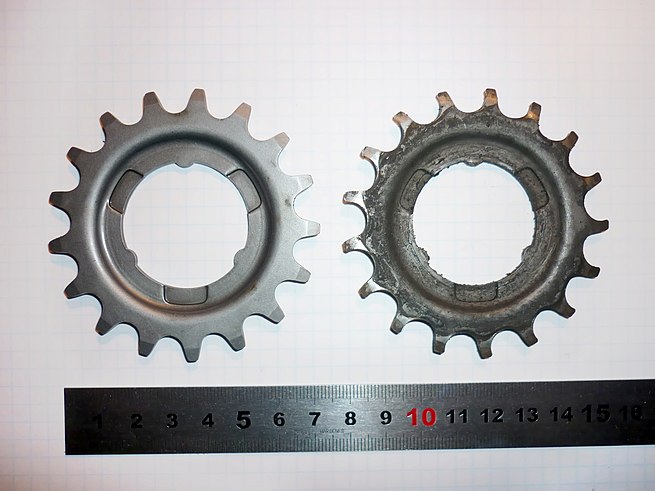-
Wear
Wear is related to interactions between surfaces and specifically the removal and deformation of material on a surface as a result of mechanical action of the opposite surface.mechanical wear is caused by most use of metal by sliding, impact, cutting etc..
In materials science, wear is erosion or sideways displacement of material from its “derivative” and original position on a solid surface performed by the action of another surface.
Wear of metals occurs by the plastic displacement of surface and near-surface material and by the detachment of particles that form wear debris. The size of the generated particles may vary from millimeter range down to an ion range. This process may occur by contact with other metals, nonmetallic solids, flowing liquids, or solid particles or liquid droplets entrained in flowing gasses.
Wear can also be defined as a process where interaction between two surfaces or bounding faces of solids within the working environment results in dimensional loss of one solid, with or without any actual decoupling and loss of material. Aspects of the working environment which affect wear include loads and features such as unidirectional sliding, reciprocating, rolling, and impact loads, speed, temperature, but also different types of counter-bodies such as solid, liquid or gas and type of contact ranging between single phase or multiphase, in which the last multiphase may combine liquid with solid particles and gas bubbles.
-
Wear (verb)
To carry or have equipped on or about one’s body, as an item of clothing, equipment, decoration, etc.
“He’s wearing some nice pants today.”
“She wore her medals with pride.”
“Please wear your seatbelt.”
“Can you wear makeup and sunscreen at {{the same time?”
“}} He was wearing his lunch after tripping and falling into the buffet.”
-
Wear (verb)
To have or carry on one’s person habitually, consistently; or, to maintain in a particular fashion or manner.
“He wears eyeglasses.”
“She wears her hair in braids.”
-
Wear (verb)
To bear or display in one’s aspect or appearance.
“She wore a smile all day.”
“He walked out of the courtroom wearing an air of satisfaction.”
-
Wear (verb)
To overcome one’s reluctance and endure a (previously specified) situation.
“I know you don’t like working with him, but you’ll just have to wear it.”
-
Wear (verb)
To eat away at, erode, diminish, or consume gradually; to cause a gradual deterioration in; to produce (some change) through attrition, exposure, or constant use.
“You’re going to wear a hole in the bottom of those shoes.”
“The water has slowly worn a channel into these rocks.”
“Long illness had worn the bloom from her cheeks.”
“Exile had worn the man to a shadow.”
-
Wear (verb)
To undergo gradual deterioration; become impaired; be reduced or consumed gradually due to any continued process, activity, or use.
“The tiles were wearing thin due to years of children’s feet.”
-
Wear (verb)
To exhaust, fatigue, expend, or weary.
“His neverending criticism has finally worn my patience.”
“Toil and care soon wear the spirit.”
“Our physical advantage allowed us to wear the other team out and win.”
-
Wear (verb)
To last or remain durable under hard use or over time; to retain usefulness, value, or desirable qualities under any continued strain or long period of time; sometimes said of a person, regarding the quality of being easy or difficult to tolerate.
“Don’t worry, this fabric will wear. These pants will last you for years.”
“This color wears so well. I must have washed this sweater a thousand times.”
“I have to say, our friendship has worn pretty well.”
“It’s hard to get to know him, but he wears well.”
-
Wear (verb)
(in the phrase “wearing on (someone)”) To cause annoyance, irritation, fatigue, or weariness near the point of an exhaustion of patience.
“Her high pitched voice is really wearing on me lately.”
-
Wear (verb)
To pass slowly, gradually or tediously.
“wear on, wear away.”
“As the years wore on, we seemed to have less and less in common.”
-
Wear (verb)
To bring (a sailing vessel) onto the other tack by bringing the wind around the stern (as opposed to tacking when the wind is brought around the bow); to come round on another tack by turning away from the wind. Also written “ware”. Past: weared, or wore/worn.
-
Wear (verb)
To guard; watch; keep watch, especially from entry or invasion.
-
Wear (verb)
To defend; protect.
-
Wear (verb)
To ward off; prevent from approaching or entering; drive off; repel.
“to wear the wolf from the sheep”
-
Wear (verb)
To conduct or guide with care or caution, as into a fold or place of safety.
-
Wear (noun)
(in combination) clothing
“footwear; outdoor wear; maternity wear”
-
Wear (noun)
damage to the appearance and/or strength of an item caused by use over time
-
Wear (noun)
fashion
-
Ware (adjective)
Aware.
-
Ware (adjective)
wary; cautious
-
Ware (noun)
The state of being aware; heed.
-
Ware (noun)
Goods or a type of goods offered for sale or use.
-
Ware (noun)
See wares.
-
Ware (noun)
Pottery or metal goods.
“damascene ware, tole ware”
-
Ware (noun)
A style or genre of artifact.
-
Ware (noun)
Crockery.
-
Ware (noun)
seaweed
-
Ware (verb)
To be ware or mindful of something.
-
Ware (verb)
To protect or guard (especially oneself); to be on guard, be wary.
“ux|en|Ware thee. (watch yourself)”

